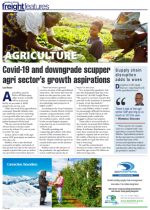Agriculture may be better off than many other sectors in South Africa at present, but by no accounts is 2020 going to be an easy year.That’s the word from agricultural economist Wandile Sihlobo who says while the sector is expecting to see growth after two years of consecutive contraction, weakened global demand will hit hard.
“We are convinced that South Africa’s farm economy could recover by at least 5% year on year in 2020,” he said. In fact, there is talk of the agri sector GDP growing by as much as 10% this year.Sihlobo, who is also the head economist at Agbiz, said much of this growth was due to the massive output of grains this year as well as an expected record citrus harvest.“There has been a general recovery in most of the agricultural subsectors.
The sector has been hit hard over the past two years, but improved weather conditions have led to an increase in summer crops area plantings and prospects of higher y ields.”
According to the Crop Estimates Committee, South Africa’s 2019/20 summer crops production could increase by 26% year on year to 16.8 million tonnes, which could be the second-largest summer crops harvest on record after the 2016/17 crop.
“Broadly speaking and comparing agriculture with other sectors of the economy there is general optimism about the sector, but the output could have grown at a much better pace in the absence of corona.”Sihlobo said in the absence of the pandemic, the agricultural sector could have grown by at least 15% this year.
“It is not just the pandemic, but also the downgrade that has to be factored in,” he told Freight News. “We expect to see lower exports this year due to the weakness in demand in many of our big markets.”It would also increase imported costs, said Sihlobo, while it would be increasingly difficult for farmers to get credit. South Africa at sub investment grade would also struggle to attract investment.
“Farm debt is at record levels in the country at around R168 billion. Debt is not necessarily the worst thing. It indicates that farmers, over time, have acquired the necessary capital to expand, but we now face the reality of having no returns on that capital to repay the debt, and that is worrying.”He said the central bank’s decision to reduce interest rates had saved the agri sector R3 billion on debt servicing costs.

